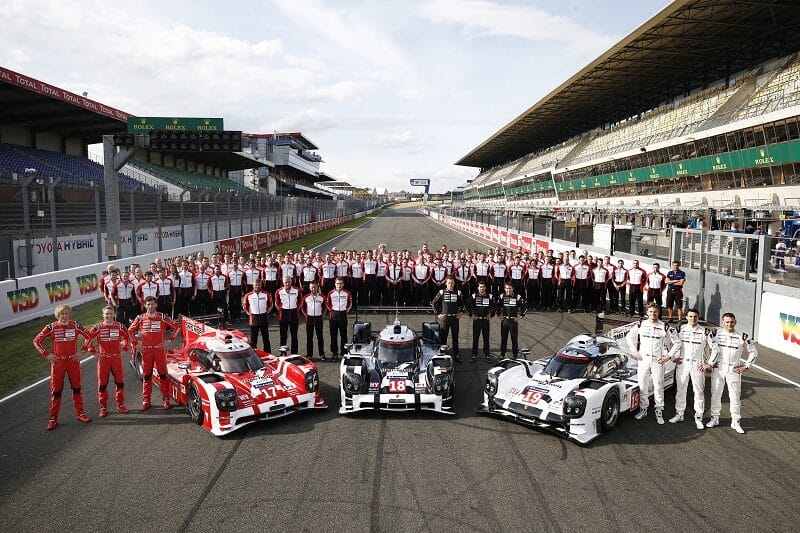Porsche has been a household name in endurance and sportscar racing since the 1970s, bringing with it a host of success from the FIA World Endurance Championship, IMSA WeatherTech SportsCar Championship and 24 Hours of Le Mans. It is probably the brand’s most famous racing discipline, and one the German manufacturer has always excelled in, whether in GT or prototype machinery.
The Porsche 917, as mentioned in the first part of our Porsche story, brought the marque their first taste of glory at the prestigious 24-hour race around Le Mans in 1970. Hans Herrmann and Richard Attwood were behind the wheel of the 917K, and sped around the Circuit de la Sarthe for 343 laps (4607.81 km) to stand on the top step for Porsche. It marked the beginning of what would become a long and successful journey through global endurance racing.
Following the 917’s success, newer iterations of the car – the 911-based 934, 935 and 936 – took to the track to continue to keep Porsche as a dominant figure in endurance racing, especially the 24 Hours of Le Mans. The trio of cars were unbeatable in the 1970s, establishing the German brand as the car to beat in Group 4, 5 and 6 racing. During this decade of racing, Porsche tallied in five overall victories to claim an astonishing 50% win rate at Le Mans in that decade.
One of the most iconic sportscar prototypes to ever be produced and raced has to be the Porsche 956/962C, and came after the brand’s extremely successful period of the 1970s. Designed in 1982 by Norbert Singer the car is best known for its spectacular performance at Le Mans and its 35-year record for the fastest lap around the Nurburgring Nordschleife.

In its first year at the prestigious race (its debut year 1982), it showed up the entire field. Jacky Ickx and Derek Bell were in the car for their second race in the 956 and they showed to be a dominant pairing. The car never gave up the led of the race for the entire 24 hours, claiming overall victory and a third race victory for the Ickx/Bell pair. Not only was it an incredible achievement for the Ickx/Bell partnership and Porsche, but the car was so dominant the other two factory 956s completed the podium. The cars finished in numerical order (#1, #2, #3 as the cars had these numbers thanks to Icks and Bell winning Le Mans in 1981); a long-standing tribute to one of the most successful sportscars in history.
This title was solidified a year later when German racer Stefan Bellof took the 956 for a lap around the Nordshleife. His insane 6:11.130 time stood as the lap record around the track for 35 years until a fellow German driver, Timo Bernhard, brought another incredibly successful Porsche prototype – the 919 Hybrid – to the track, beating Bellof’s lap time by almost a minute (5:19.545).
Although Porsche seized racing with factory cars in 1983, the 956 continued its dominance with privateers, claiming the next three Le Mans back to back. The Porsche dominance did not end there however, as the next evolution of the Porsche prototype – 926C – continued the trend, keeping Porsche on the top step of the Le Mans podium until 1988. Porsche also stopped their factory efforts in IMSA in 1982, once again handling Porsche operations over to customer teams. The 924 GTR continued Porsche’s successes across the pond with an IMSA GTO class win in the hands of Doc Bundy and Marcel Mignot under the Goodrich Brornos Team banner in 1982.
But Porsche’s racing career in IMSA with their prototypes was deemed to be short lived. After a decade away, Porsche were looking at returning to the American endurance scene with Tom Walkinshaw Racing. They were going to fit the Porsche engine from their prototypes to a chassis formerly used in the Jaguar XJR-14 and Mazda MXR-01, but similarly to their thawed IndyCar efforts in the 90s, IMSA too were not happy with the Porsche car. Rules changes deemed that the Porsche/Tom Walkinshaw Racing car was illegal and could not take part in the 1995 season. The car was not scrapped though, and Joest Racing took it to race in Europe (under the new name Porsche WSC-95), claiming back-to-back overall Le Mans victories in 1996/97. The 1997 win notable as it was Tom Kristensen‘s first Le Mans appearance and first overall victory around the Circuit de la Sarthe.

1998 saw a turning point for Porsche, who focused in on GT racing cars. The factory efforts gave up on overall Le Mans victories and honed in on the GT classes, taking the time to develop their water-cooled 996 GT3 competitor. As the car continued to develop, Porsche found their natural standing point at the top of the podium, finding success in endurance GT racing. The cars that were developed to race were now based off of road cars rather than their radical prototypes from the 60s and 70s, starting to propel the brand into the spotlight of not only a successful racing team, but also a successful sports car designer for consumers.
For just under two decades Porsche focused only on their GT racing efforts, developing the 996 GT3 into the 911 RSR that continues to race for Porsche on the track today. Since 1998, Porsche have secured multiple Le Mans GTE class victories (most recently in 2018), seven 24 Hours of Nurburgring wins and four Spa 24 Hours top steps, along with victory at the 24 Hours of Daytona in 2003, Petit Le Mans in 2015 and Bathurst 12 Hours in 2019.

2014 saw Porsche, whilst continuing their GT efforts, return back to prototype racing, and once again become the dominant force as they had been 30 years earlier. The 919 Hybrid almost exceeded expectation in its first year at Le Mans, and had it not have suffered an engine failure with half an hour left on the clock it had been set to challenge Audi for the overall win. Alas, the very next year – entering three of their hybrids into the prestigious race – their time came again. For the next three years there was no other car on the top step at the Circuit de la Sarthe, bringing Porsche’s overall win tally at Le Mans up to 19, the most overall wins to ever be achieved by a manufacturer. Also claiming the drivers’ and manufacturers’ World Endurance Championship titles in these years as well (2015-2017), Porsche solidify their name as one of the most successful prototype sportscar manufacturers of all time.
Financial issues for Volkswagen saw Porsche once again hang up their prototype racing efforts at the end of 2017, a year after sister VW brand Audi had left the prototype race, and return to only racing in GT categories. However, a recent announcement means Porsche will be back where they race best in 2023. The new Hypercar class that crosses over WEC and IMSA will allow Porsche to race their new prototype in both Europe and America, looking to finally show the USA what they can do with prototype sportscars.
Next time in the final part of The Porsche Story, TheCheckeredFlag will conclude this series by looking over the German manufacturer’s move towards electric racing and what comes next for the marque in their Race to the Future.



